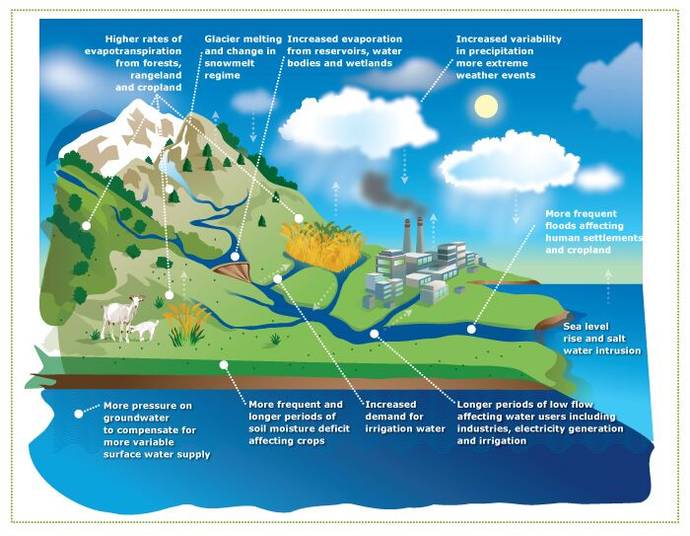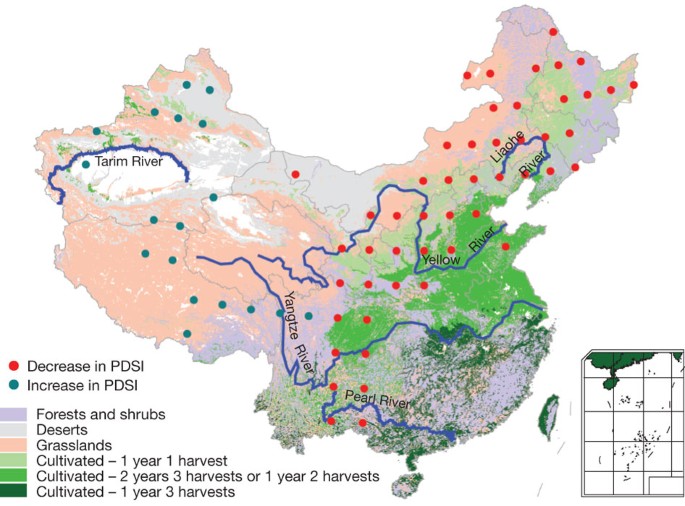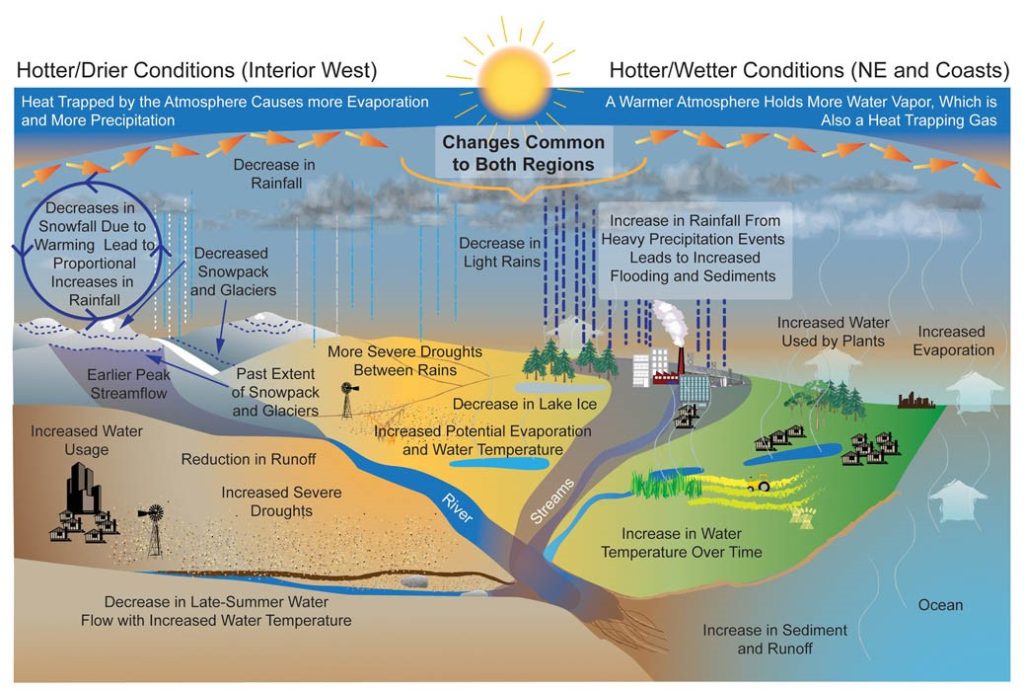Have you ever wondered how climate change is impacting the water management practices on farms? As a farmer or someone interested in sustainable agriculture, you understand that water is the lifeblood of farming.
Yet, with shifting weather patterns, rising temperatures, and unpredictable rainfall, managing this precious resource has become more challenging than ever. You’ll discover how climate change is reshaping the way you approach water management on your farm. Learn practical strategies to adapt and ensure the sustainability of your crops.
Dive in to find out how you can take control, protect your yields, and safeguard your future.

Impacts On Water Resources
Climate change disrupts farming water management by altering rainfall patterns and increasing droughts. Farmers struggle with unpredictable water supplies. Efficient strategies become essential to ensure crops get enough water.
Climate change is reshaping how we think about water management in farming. This isn’t just a distant threat; it’s impacting water resources right now. As temperatures rise and weather patterns shift, farmers face new challenges in accessing and managing water. These changes demand proactive strategies to ensure crops get the water they need.Changing Rainfall Patterns
Rainfall is becoming unpredictable. Some areas experience heavy downpours, while others face prolonged droughts. This inconsistency makes it tough for farmers to plan irrigation schedules. You might find yourself waiting for rain that never comes or dealing with floods that wash away your efforts.Increased Water Demand
Higher temperatures mean crops need more water to survive. As a farmer, you might notice your plants wilting quicker than before. This increased demand can strain existing water resources, forcing you to rethink irrigation methods and explore water-saving technologies.Decline In Water Quality
Climate change can degrade water quality. Rising sea levels and changing precipitation can lead to saltwater intrusion and pollution. Imagine using water that’s less pure for your crops. This can affect yield and soil health, urging you to implement filtration systems or alternative sources.Stress On Groundwater Supplies
Groundwater, a crucial resource for many farmers, faces depletion. Over-reliance on these supplies during dry spells can lower water tables and reduce availability. Consider what happens when your reliable well starts to run dry. It’s a wake-up call to adopt sustainable practices and investigate new sources.Impact On Irrigation Systems
Traditional irrigation systems may not cope well with climate-induced changes. You might need to update or replace outdated equipment to adapt to new realities. This could mean investing in drip irrigation or smart systems that optimize water use based on real-time data. As you navigate these challenges, ask yourself: Are your current water management strategies equipped to handle these shifts? Adapting to climate change’s impact on water resources isn’t just about survival—it’s about thriving in a new world of farming. What steps can you take today to ensure your farm’s future?
Challenges In Irrigation
Climate change poses serious challenges for irrigation in farming. Water scarcity is becoming a frequent issue. Farmers face unpredictable water supply. These challenges demand urgent solutions.
Water Scarcity
Decreased rainfall leads to water scarcity. Reservoirs and rivers dry up faster. This makes irrigation difficult. Farmers need alternative water sources. They must find ways to conserve water.
Unpredictable Weather Patterns
Weather patterns have become unpredictable. Sudden storms can flood fields. Long droughts can dry out crops. Farmers struggle to plan irrigation schedules. This unpredictability affects crop yield.
Increased Evaporation Rates
Rising temperatures increase evaporation. Water in soil and rivers evaporates faster. More water is needed for irrigation. This increases the demand on limited water supplies.
Soil Degradation
Intensive irrigation leads to soil degradation. Salinity levels in soil rise. This affects plant growth. Farmers need to manage soil health carefully. Better soil management can improve irrigation efficiency.
Infrastructure Challenges
Old irrigation systems are inefficient. They waste a lot of water. Modern systems are expensive to install. Many farmers lack resources for upgrades. Efficient irrigation infrastructure is crucial.
Soil Health And Water Retention
Climate change is reshaping water management in farming. One crucial aspect is soil health and water retention. Healthy soil holds water better, reducing the need for irrigation. This is vital as water scarcity increases. Farmers need to focus on soil health to adapt to changing climates.
How Soil Structure Influences Water Retention
Soil structure impacts its water-holding capacity. Well-structured soil has spaces for air and water. This balance helps roots access water and nutrients. Poorly structured soil struggles to retain water. Compacted soil limits water absorption and root growth.
The Role Of Organic Matter In Soil
Organic matter boosts soil’s ability to hold water. It acts like a sponge, retaining moisture for plants. Decomposed plant and animal materials enrich the soil. This process improves water retention and soil fertility. Farmers should incorporate organic matter into their fields.
Impact Of Climate Change On Soil Moisture
Climate change affects soil moisture levels. Rising temperatures increase evaporation rates. This leads to drier soil conditions. Erratic rainfall patterns also disrupt soil moisture balance. Farmers face challenges in maintaining optimal moisture levels.
Sustainable Practices For Better Water Management
Sustainable farming practices enhance water retention. Crop rotation and cover crops protect soil structure. These methods prevent erosion and improve water infiltration. Mulching reduces surface evaporation, conserving soil moisture. Farmers can adopt these practices to combat climate impacts.
The Importance Of Monitoring Soil Moisture
Monitoring soil moisture is essential for effective water management. Sensors provide real-time data on soil conditions. This information helps farmers make informed irrigation decisions. Proper monitoring ensures efficient water use. It also minimizes the risk of over-irrigation.

Adaptive Strategies For Farmers
Climate change alters weather patterns and affects water resources globally. Farmers face the challenge of adapting their water management practices to these changes. They must develop innovative strategies to ensure sustainable water use. These adaptations are crucial for maintaining crop yields and protecting the environment.
Efficient Irrigation Techniques
Efficient irrigation saves water and ensures crops receive adequate moisture. Drip irrigation delivers water directly to the plant roots. This method reduces evaporation and water waste. Farmers can use sensors to monitor soil moisture levels. This data helps them decide when and how much to irrigate.
Water Recycling And Reuse
Recycling water helps farmers conserve resources. They can collect and treat runoff water from fields. This recycled water can irrigate crops during dry spells. Farmers also use greywater from household activities for irrigation. This practice reduces the demand on freshwater sources.
Soil Management Practices
Healthy soil retains more water, reducing irrigation needs. Farmers can improve soil health by adding organic matter. Techniques like cover cropping prevent soil erosion and improve water retention. No-till farming helps maintain soil structure and moisture levels.
Crop Selection And Rotation
Choosing drought-resistant crops can help farmers reduce water use. These crops require less water and withstand dry conditions. Rotating crops improves soil health and reduces pest pressure. This practice can lead to better water retention and reduced irrigation needs.
Rainwater Harvesting
Collecting rainwater provides an alternative water source. Farmers can use rooftops and catchment systems to gather rainwater. This stored water can irrigate crops during dry periods. Rainwater harvesting is cost-effective and reduces reliance on traditional water sources.
Conclusion
Climate change challenges water management in farming significantly. Farmers face unpredictable weather patterns. These changes demand smart water use strategies. Efficient irrigation is crucial for crop survival. Conserving water resources becomes a priority. Farmers need adaptable plans for future growth.
Understanding climate impacts helps manage resources wisely. Collaboration between farmers and scientists can improve practices. Sustainable farming ensures a stable food supply. Embracing new methods leads to better water management. This is essential for agricultural success. Ultimately, thoughtful water use benefits everyone.



